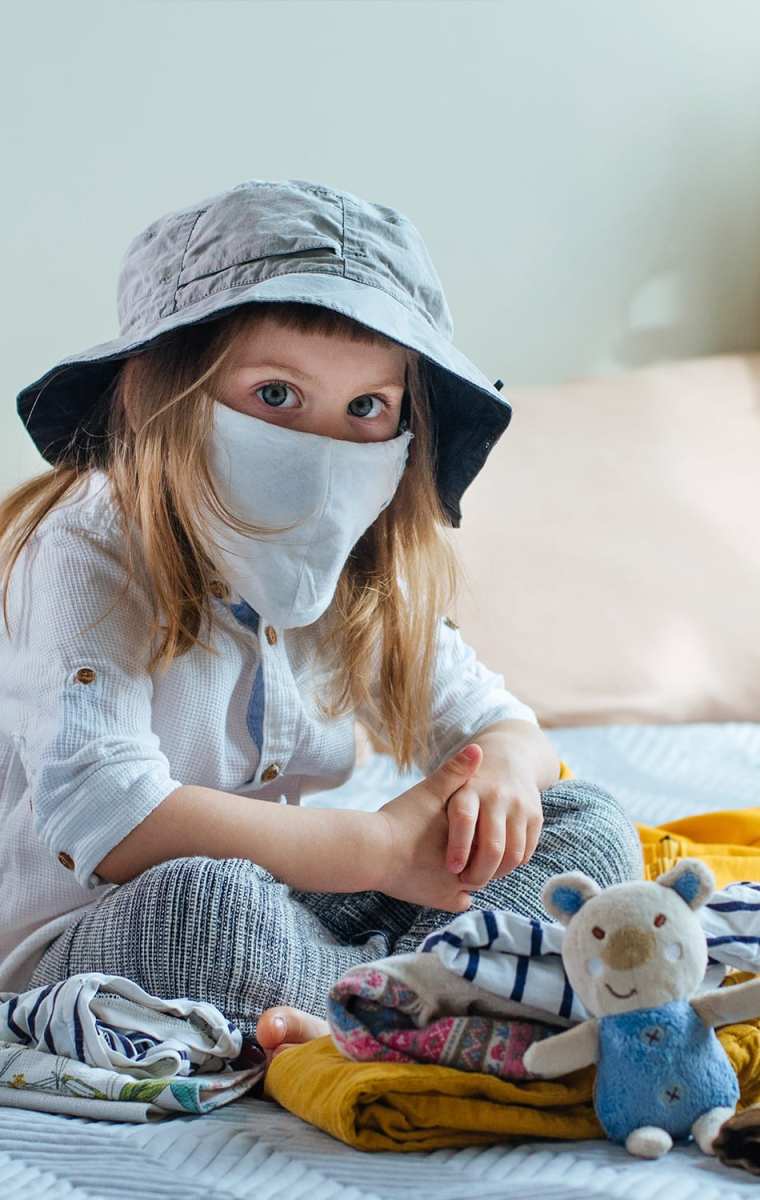Here’s What You Need To Know:
- To date, Coronavirus in babies is significantly less severe versus older populations.
- According to the CDC, COVID-19 afflicted babies generally have mild, cold-like symptoms, such as a fever, runny nose, and a dry cough.
- Have the whole family frequently wash their hands, mask up, socially distance, and disinfect surfaces.
- Keep your immune system strong by getting good sleep, exercising, not smoking, and keeping stress to a minimum.
- Zinc, selenium, iron, folate, beta carotene, vitamin C, and vitamin E all help the body fight off pathogens.
Coronavirus Appears Less Severe for Babies
Para
To date, Coronavirus in babies is significantly less severe versus older populations. According to the CDC, COVID-19 afflicted babies generally have mild, cold-like symptoms, such as a fever, runny nose, and a dry cough. (1)
In fact, a review of tens of thousands of confirmed COVID-19 cases in China revealed that there were no deaths under age 10. (2) This seems to indicate that babies with coronavirus have a much stronger defense than the rest of the population. So while the virus is a serious issue, you can find comfort in knowing that your baby will probably fare better than most in your household, even though their immune system is still developing. Still, any measure to prevent coronavirus exposure for you and your baby should be taken, such as hand washing and avoiding large crowds.
While scientists are still determining why this is the case, one theory is that a child’s less mature immune system is an advantage. An adult’s immune system has decades of experience identifying and fighting infections. This helps the immune system quickly mount a robust defense – but sometimes this inflammatory response is too much. (3)
Below are a couple things you can do to minimize infection:




Wash you and your kids’ hands
Do it for at least 20 seconds with soap and water. Sing Happy Birthday, the alphabet song, or the jeopardy theme to make sure you wash long enough. Make sure to get those less obvious spots, like underneath your nails and in between your fingers, too. Turn washing your hands into a habit, especially before you eat and anytime you reenter your home.
If you can’t wash, use hand sanitizer. Make sure it’s at least 60% alcohol. Keep some sanitizer in your bag, or car, while you’re on the go.
Mask Up
Wear a face mask anytime you leave the house, especially if you are heading to a high-traffic area (which you should avoid). It is possible to have an asymptomatic case, so you are also protecting others with your mask. If you are caring for or will be in close proximity of someone who may be infected, you should wear an n95 respirator with no valves. Make sure your mask is properly fitted to your face and has a tight seal.
Keep Your Distance
Try to maintain 6 feet of distance between you and other people. Avoid crowded areas, like packed subway cars or concerts, as well.
Disinfect Surfaces:
Regularly disinfect personal electronics and other “high-touch” surfaces such as doorknobs. Washing your hands will do very little if you are still scrolling on a dirty phone. Apple recommends using a 70 percent isopropyl alcohol wipe or Clorox Disinfecting Wipes, more info here.
More Ways to Stay Safe:
Keep your hands off your face: Avoid touching your face, especially your eyes, mouth, nose.
Cover your cough/sneezes: Use a disposable tissue when possible. Sneeze away from people if you can.
Stay home if you feel unwell: If you’re sick, or if anyone in your home is sick, keep them (and yourself) at home. If you suspect you have Covid-19, call your healthcare provider or local public health department before seeking medical care. Your provider may need to take special precautions before you arrive.
Get good sleep: Try to get as much sleep as possible. Parents tend to get the short end of the stick here, but if you can, get those extra Z’s. Your immune system needs it to properly fight off infections.
Stay Healthy: Don’t smoke. Eat a nutritious diet high in vegetables and fruits, exercise regularly, and try to keep stress at a minimum.

Don’t Forget About Nutrition
Right now, nutrition is more important than ever. You and your little one need all the tools necessary to keep infections at bay. Focus on real foods with immunity-boosting properties. Here are some key nutrients and where you can find them:
Zinc is a key nutrient for the immune system. A zinc deficiency is correlated with increased susceptibility to pneumonia and other infections among children and the elderly. Where to find it: beans, nuts, red meat, and oysters.
Selenium lowers inflammation by reducing oxidative stress. It also inhibits the replication of viruses. Where to find it: grains, garlic, broccoli, nuts, especially Brazil nuts, walnuts, fish, and beef.
Iron activates and grows immune cells. Where to find it: white beans, lentils, spinach (other dark leafy greens), and organ meats.
Folate/Folic Acid keeps red blood cells healthy and supports red and white cell growth. Where to find it: broccoli, brussels sprouts, cabbage, kale, chickpeas, and kidney beans.
Beta carotene, which is converted to vitamin A in the body, helps regulate cellular immune responses. It has been shown to have anti-inflammatory properties. Where to find it: carrots, apricot, mangoes, spinach, cantaloupe.
Vitamin C supports cellular function, neutralizes free radicals, and keeps inflammation in check. It also helps with the absorption of iron. Where to find it: oranges (or any citrus fruit), kiwis, bell peppers, and broccoli.
Vitamin E is a powerful antioxidant. T and B-cell functions are impaired when you don’t have enough vitamin E in your diet. Where to find it: wheat germ oil, sunflower seeds, almonds, pine nuts, salmon, and kiwi.
Summary
Being a parent was already a tough gig. Throw a pandemic on top of everything else, and you have a bunch of extremely overwhelmed caregivers.
During these uncertain times, you can find comfort in knowing you are not alone. Just do your best, and be kind to yourself.
Sources
- “Frequently Asked Questions and Answers: Coronavirus Disease-2019 (COVID-19) and ChildrenPage.” National Center for Immunization and Respiratory Diseases (NCIRD), Division of Viral Diseases, 1 March 1, 2020, https://www.cdc.gov/coronavirus/2019-ncov/specific-groups/children-faq.html .
- Wu Z, McGoogan JM. Characteristics of and Important Lessons From the Coronavirus Disease 2019 (COVID-19) Outbreak in China: Summary of a Report of 72 314 Cases From the Chinese Center for Disease Control and Prevention. JAMA. Published online February 24, 2020. doi:10.1001/jama.2020.2648
- Tisoncik, Jennifer R et al. “Into the eye of the cytokine storm.” Microbiology and molecular biology reviews : MMBR vol. 76,1 (2012): 16-32. doi:10.1128/MMBR.05015-11
- “Zinc.” Office of Dietary Supplements, 19 December 2019, https://ods.od.nih.gov/factsheets/Zinc-Consumer/
- Barnett, Junaidah B et al. “Low zinc status: a new risk factor for pneumonia in the elderly?.” Nutrition reviews vol. 68,1 (2010): 30-7. doi:10.1111/j.1753-4887.2009.00253.x
- Cherayil, Bobby J. “The role of iron in the immune response to bacterial infection.” Immunologic research vol. 50,1 (2011): 1-9. doi:10.1007/s12026-010-8199-1
- Sgarbanti, Rossella et al. “Intracellular redox state as target for anti-influenza therapy: are antioxidants always effective?.” Current topics in medicinal chemistry vol. 14,22 (2014): 2529-41. doi:10.2174/1568026614666141203125211
- “Iron needs of babies and children.” Paediatrics & child health vol. 12,4 (2007): 333-6. doi:10.1093/pch/12.4.333
- Hoffmann, Peter R, and Marla J Berry. “The influence of selenium on immune responses.” Molecular nutrition & food research vol. 52,11 (2008): 1273-80. doi:10.1002/mnfr.200700330
- Lee, Ga Young, and Sung Nim Han. “The Role of Vitamin E in Immunity.” Nutrients vol. 10,11 1614. 1 Nov. 2018, doi:10.3390/nu10111614











